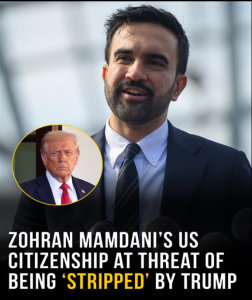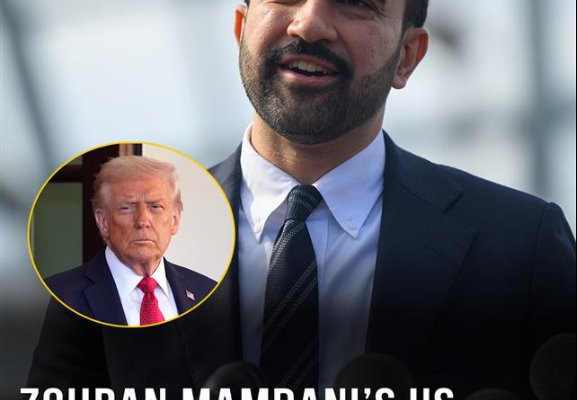
Zohran Mamdani Faces Deportation Threat from Donald Trump
In a dramatic escalation of political tension, Donald Trump has publicly threatened to arrest and deport Zohran Mamdani, the newly minted Democratic nominee for New York City mayor. The clash underscores not only sharp partisan divides but also deep anxieties about immigration, citizenship, and the limits of executive power.
Mamdani, a 33-year-old New York State Assembly member, won the Democratic primary in a major upset, defeating former governor Andrew Cuomo. His campaign has emphasized progressive – even democratic-socialist – policies: fighting for working-class New Yorkers, resisting ICE raids, and pushing for more legal support for immigrants.
Donald Trump responded to Mamdani’s primary victory with pointed hostility. During a visit to a migrant detention center in Florida, Trump told reporters that if Mamdani, who has vowed to block ICE in New York, refused to cooperate with immigration enforcement, “we’ll have to arrest him.” Trump added that he would be keeping a close eye on Mamdani, calling him a “communist” and questioning the legitimacy of his citizenship. The Washington Post+2The Daily Beast+2
The Core of Trump’s Accusations
Trump’s remarks revolve primarily around two connected lines of attack:
-
Immigration Policy Conflict
Mamdani has explicitly pledged not to help ICE with immigration raids if elected. That’s a major red line for Trump, whose base supports strict immigration enforcement. By tying Mamdani to an open defiance of ICE, Trump frames him not just as a radical politician, but as someone who would undermine federal immigration laws. Breitbart+1 -
Questioning Citizenship
Perhaps more dangerously, Trump suggested investigating whether Mamdani acquired his U.S. citizenship illegally. “A lot of people are saying he’s here illegally … we’re going to look at everything,” Trump said. The Daily Beast+2Breitbart+2 He even floated the idea of stripping Mamdani of his citizenship, raising specters of denaturalization — a process historically reserved for very serious crimes, not political disagreement. The Guardian+1
Mamdani’s Response: Defiance Over Intimidation
Zohran Mamdani didn’t back down. He fired back on social media, calling Trump’s threat “an attack on our democracy” and framing it as an effort to silence dissent. The Daily Beast In his public statement, he said:
“The President … just threatened to have me arrested, stripped of my citizenship, put in a detention camp and deported. Not because I have broken any law but because I will refuse to let ICE terrorize our city.” Newsweek+1
“If you speak up, they will come for you … We will not accept this intimidation.” Yahoo+1
Mamdani’s response frames the confrontation as about more than just him personally — it’s a warning to all New Yorkers who speak out. He positions himself as a defender of immigrant communities and free expression, resisting what he labels authoritarian tactics.
Legal and Constitutional Realities
From a legal standpoint, many of Trump’s threats appear more rhetorical than practical — or at least legally questionable.
-
Citizenship Status: Mamdani was born in Uganda to Indian parents and moved to the U.S. when he was about seven years old. Newsweek He became a naturalized U.S. citizen in 2018. The Guardian There is no publicly presented, credible evidence so far that he concealed anything in the naturalization process, nor that he committed fraud. Right-wing critics have raised allegations — including a Republican congressman accusing him of “concealment of material support for terrorism” during naturalization — but those remain claims, not proven facts. The Guardian
-
Cooperation with ICE: Crucially, under U.S. law, state and local governments are generally not required to assist ICE in civil immigration enforcement. The Indian Express That means Mamdani’s pledge to resist ICE operations would not necessarily violate any federal law.
-
Denaturalization Risks: Stripping someone of their citizenship (denaturalization) is a serious and rarely used power. It usually requires evidence of serious wrongdoing — not simply political opposition or policy conflict. The mere threat of revoking citizenship for political reasons raises serious constitutional and civil-rights risks, according to legal scholars.
Political Implications
This showdown has huge political stakes, both symbolically and practically.
-
Immigrant Communities on Alert
Mamdani’s defiance resonates in New York’s large immigrant communities. His candidacy is already historic: if elected, he could become the first Muslim or South-Asian mayor of New York City. Newsweek By positioning himself as a protector of immigrants, he taps into real fears and hopes around ICE enforcement and citizenship rights. -
Escalation in Trump’s Rhetoric
Trump’s threat illustrates how serious he’s willing to be in targeting political opponents. This isn’t just name-calling: it’s a threat framed in terms of deportation and revoking citizenship. Whether or not the administration actually follows through, the rhetoric itself is deeply polarizing. -
Democratic Backlash
Many on the left, especially civil-rights and immigrant-advocacy groups, see this as a dangerous overreach. Denaturalization used as a political tool is alarming, and they are likely to rally around Mamdani. In fact, some Democratic leaders have already pushed back. The Guardian -
Mayoral Race Dynamics
Mamdani’s primary win put him in a strong position. But now, his campaign is not only about policy; it’s become a referendum on identity, power, and immigration. His defiance may energize his base, but Trump’s attacks could also mobilize conservative opposition — especially among voters who equate his “socialist” politics with extremism.
Broader Significance: Democracy, Intimidation, and Identity
Beyond the immediate political theater, this clash touches on deeper issues in American democracy:
-
Intimidation as Strategy. Trump’s language suggests not just criticism, but intimidation. When a sitting or former president threatens to strip someone of citizenship, it sends a chilling signal to critics: dissent may have serious personal consequences. Mamdani frames this as more than an attack on himself — it’s an attack on democratic participation and immigrant voices.
-
The Naturalization Debate. The idea of revoking citizenship brings up historical parallels — and dangers. In modern America, denaturalization has been used in the past, but the specter of doing so for political reasons worries civil-liberties advocates. It raises fundamental questions about who belongs, who gets to speak, and who is considered loyal.
-
Local vs. Federal Power. Mamdani’s platform challenges how much local governments should cooperate with federal immigration enforcement. His resistance spotlights real tensions between municipal autonomy and federal authority — especially in diverse, sanctuary-friendly cities.
-
Identity Politics. Mamdani’s background — immigrant, Muslim, socialist — is central to both his campaign and the attacks on him. For his supporters, he represents a new kind of leadership in New York: someone who embodies the city’s diversity and stands up for marginalized communities. For his critics, that identity becomes a tool for fearmongering.
Risks, Challenges & What’s Next
There are real risks for both sides:
-
For Mamdani: Trump’s threats, even if partly symbolic, could fuel false narratives about his citizenship, weaken public perception, and potentially trigger legal or congressional scrutiny. He must navigate these attacks while staying true to his campaign promises.
-
For Trump: By making such personal threats, he further polarizes the electorate and risks accusations that he is weaponizing government power for political ends. He also opens himself up to legal challenge and public condemnation from civil rights groups.
-
For the Democracy: This standoff could set a dangerous precedent. If challenging someone’s citizenship becomes a mainstream political tactic, it may deepen divisions and threaten foundational values like free speech, dissent, and equality under the law.
Conclusion
The confrontation between Zohran Mamdani and Donald Trump is more than a political spat — it’s a stark illustration of how identity, power, and immigration collide in today’s America. Trump’s threat to arrest, denaturalize, and deport Mamdani is a potent escalation. Mamdani’s defiant response — “If you speak up, they will come for you. We will not accept this intimidation” — turns his campaign into a rallying cry for democratic resistance.
If Mamdani wins the mayoral election, his leadership could mark a new chapter for New York: one where immigrant voices are not just accepted, but empowered. But his journey there is now contested in the harshest possible terms — by a former president who may not merely want to beat him politically, but to silence him permanently.
This clash raises profound questions about citizenship, free speech, and who gets to belong in America. And whatever happens next — whether through court battles, political fallout, or public mobilization — the stakes could echo far beyond New York’s city limits.

